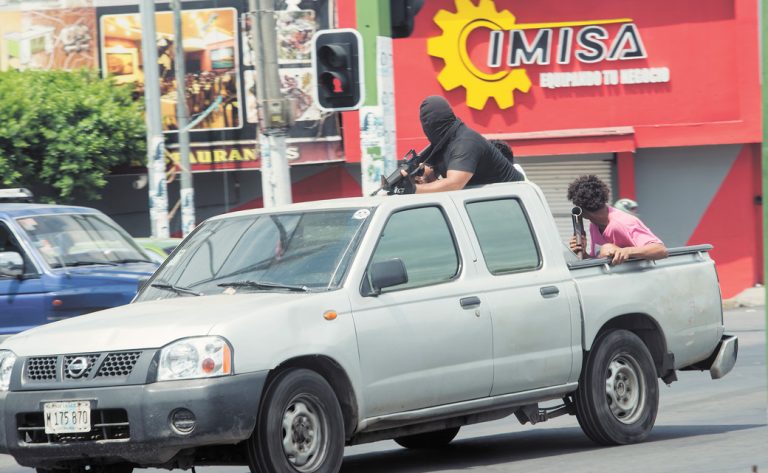19 de junio 2018

Children of Exile: The Births “Sowing Hope” in the Camp of Nicaraguan Farmers

PUBLICIDAD 1M
PUBLICIDAD 4D
PUBLICIDAD 5D
A “State terrorism” strategy, security experts explain.

The regime of Daniel Ortega is turning to paramilitary groups to repress Nicaragua civic rebellion
Daniel Ortega and Rosario Murillo regime is turning to paramilitary groups to repress Nicaragua civic rebellion (which on June 18th reached two months) because it is “cornered”, according to security experts.
Roberto Orozco and Roberto Cajina, both of whom are experts in security and public forces, believe that the paramilitaries take their orders from Ortega government, whose administration has developed a “State terrorism” strategy.
The last atrocity attributed to paramilitary groups alongside National Police forces was the fire that was started in which the Pavon familiy perished in the Carlos Marx neighborhood in Managua on Saturday morning. Paramilitary groups are at the head of a new wave of escalated violence in Nicaragua in recent weeks. With war rifles in hand and pickup trucks to mobilize in, they patrol the country’s neighborhoods where citizens have set up barricades to defend themselves against repressive acts.
“The operations side of things are being led by officials who are still faithful to the Party (Sandinista Front), but they are being organized from the highest level,” believes Orozco, who has been studying police dynamics for many years. The expert pointed out that public resources are being used (such as ministry trucks) to finance and give rise to this paramilitary movement. “This can only come from the government’s central command. It’s State terrorism which seeks to gain social control via illegal means which cause terror,” Orozco added.
Cajina claimed that the National Police and its anti-riot squads didn’t have the “tactical or operations capacity to face crowds” like the ones that have mobilized in civic protests against the regime.
“National Police forces need parapolice groups to be able to do the dirty work, even though the police are also doing the dirty work. These groups are an extension of the Police and Government,” Cajina explained on TV program Esta Semana. “The role of the paramilitary is to create terror. They are each paid 300-500 cordobas. They are mercenaries on the one hand and terrorists on the other,” the security expert revealed.
Not only security experts are highlighting the Nicaraguan Army’s high command “silence” when it comes to paramilitary groups. Citizens are too. According to Cajina, the military’s silence about the widespread socio-political crisis which has already left over 170 people dead, is the result of two factors: That the Army is trying to “distance themselves” from the Ortega/Murillo regime and, secondly, that they are trying to protect their corporate interests; including investments in the United States.
Several social groups are demanding that the military take action against these paramilitary groups. If the government’s narrative is talking about “common crimes”, then why is the military not breaking these up like they did in the past with people who took up arms in the countryside again for political reasons?
“If the army has attacked and wiped out groups that took up arms again, why aren’t they doing the same thing with paramilitary forces who are carrying war weapons illegally and violating law 510 of our Arms control regulations,” Cajina asked. The expert pointed out that Daniel Ortega, as the Army’s Commander-in-Chief, has never given an order to fight against those took up arms again in the countryside. “The Army gave this order on its own. It’s part of their annual security plan in the countryside. The question is why they aren’t giving the order to disarm these paramilitaries?”
Orozco said that the Army is in a very complicated position because it isn’t the same as the Police or Attorney General in nature, these being the ones responsible for chasing after criminals. Orozco pointed out that the Army needs to receive a constitutional order from their Commander-in-Chief, Daniel Ortega, in order to disarm the paramilitaries.
“Ortega won’t give this order. There is a conflict of interest which the army is maneuvering,” Orozco claimed. The expert stressed that if Ortega were to hypothetically give this order of disarming paramilitary groups to the military leadership, then this would be dangerous.
Dangerous because disarming them could lead to an even greater massacre, where civilians are caught in the crossfire. Orozco said that if Ortega gives a direct order to the Army, all of the responsibility will fall on his shoulders and he won’t be able to “politically play” like he has been with the paramilitaries, who he has “washed his hands of”.
Cajina agrees with his colleague on this point: If Ortega orders the Army to suppress paramilitary groups, he would be contradicting his own discourse that these irregular groups don’t exist and function in this country, despite more than enough evidence gathered by the Nicaraguan people proving the opposite.
Regarding the National Police force, Orozco doesn’t believe that the institution’s capacities exceed their scope, like Cajina believes they do. Rather the Police’s repressive acts have increased alongside the paramilitary’s violence.
“What is happening within the Police force itself is what is serious. They are suffering a huge rift,” Orozco warned. There are reports that Police abandoned their barracks in Diriamba, La Trinidad and San Nicolas.
“This can have serious consequences. Human rights organizations are already talking about 250 policemen who have resigned. They aren’t deserters, because deserters don’t resign,” Orozco explained. “There’s a divide in the police command which might have short-term consequences. This is their weakness today. The problem isn’t that the Police are overstepping the line because of the climate of insecurity, but because they are creating this insecurity themselves alongside the paramilitary,” Orozco claimed.
Archivado como:
PUBLICIDAD 3M
Periodista. Destaca en cobertura a violaciones de derechos humanos: desplazamiento forzado, tráfico ilegal en territorios indígenas, medio ambiente, conflictos mineros y ejecuciones extrajudiciales. Premio Iberoamericano Rey de España 2018.
PUBLICIDAD 3D